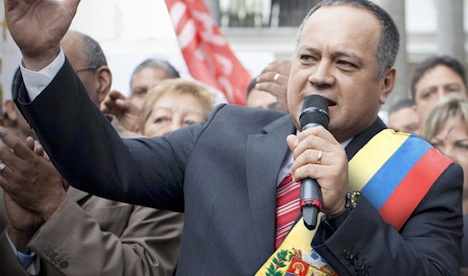Venezuela, just over a month after its still-contested presidential election, has made global headlines in the past couple of weeks for its chronic shortages of everything from toilet paper to church wine, with rationing soon to begin in the large western state of Zulia. ![]()
That means that the country’s economic collapse is proceeding more or less as depressingly predicted — with oil prices stagnating, and with the state-owned Venezuelan oil industry’s production reducing, it means that the country has fewer and fewer dollars to fuel its increasing dependency on imported goods, a shortage that’s been exacerbated by the government’s somewhat inefficient system of auctioning off the dollars to importers and the fact that the Venezuelan bolívar is fixed at an artificially high rate.
That’s one of the reasons that Nicolás Maduro, even with the full force of a government that has excelled at blurring the line between the Venezuelan state and chavismo, only barely won election follow Hugo Chávez’s death and why his challenger Henrique Capriles is still waging a campaign in the court system, however quixotic, to expose voting fraud in April’s election that could well reveal that Capriles won the election instead.
Maduro’s loss weakened his already tenuous position within the ranks of chavismo, and the key power brokers under Chávez have largely retained their roles under Maduro, including Rafael Ramírez, the energy minister and the president of the state-run oil company, Petróleos de Venezuela, S.A. (PDVSA), and Jorge Giordani, the former finance minister who remains the planning minister under Maduro. Forget the fact that new policymakers could potentially reverse course on Venezuela’s economy or that Giordani, Ramírez and Maduro appear to be doubling down on the same policies that have led to Venezuela’s precarious situation — it shows that Maduro lacks the power to replace his rivals with ministers who owe their loyalty to Maduro.
But as the economy melts down, it isn’t surprising to see chavismo itself breaking down. The first major breach came a couple of weeks ago, when a purported recording of a conversation emerged between Mario Silva, who hosts the popular, massively pro-chavista ‘La Hojilla’ television program, and Aramis Palacios, a Cuban lieutenant colonel in G2, the Cuban intelligence agency. Silva is as much of a true believer in chavismo as anyone in the top circle of Venezuela’s ruling elite, so if Silva has such wide doubts about Maduro (at one point he says, ‘we are in a sea of shit’), imagine what the rest of the government thinks.
It’s also, of course, somewhat of an international scandal as well — though Cuban intelligence long worked hand-in-hand with Chávez and the Venezuelan government, what exactly was a pro-Chávez talk show host doing talking to a Cuban spook? The link between the two countries became an issue during the campaign, with Capriles attacking the generous oil subsidies to Cuba that Chávez initiated a decade ago, and Maduro is widely believed to have been Havana’s top choice to succeed Chávez.
But the recording was most tantalizing with respect to Diosdado Cabello (pictured above) and his role in Venezuela’s future — no one has more power in post-Chávez than Cabello, including even Maduro. Continue reading It’s Diosdado Cabello’s world, the rest of Venezuela is just living in it
